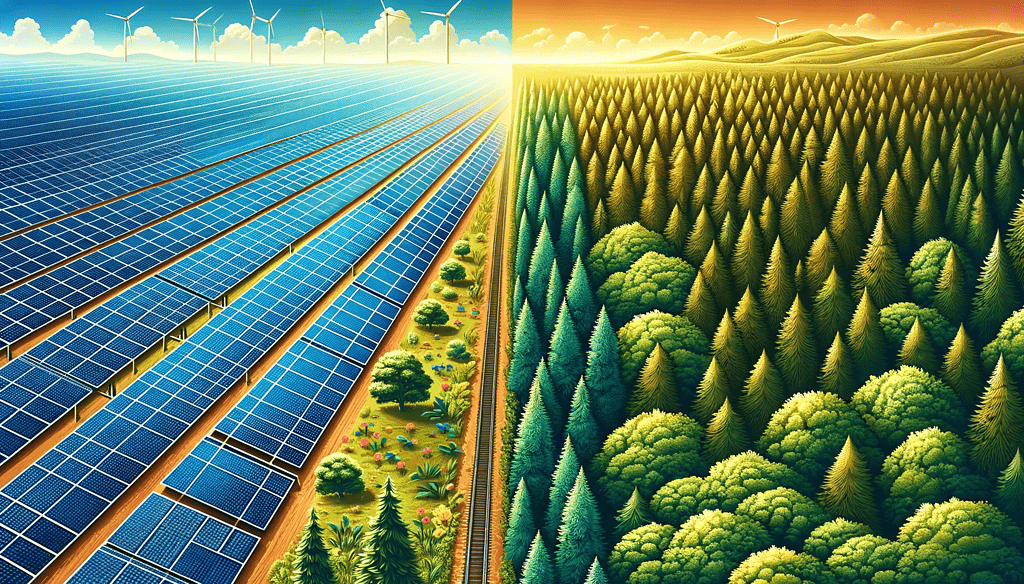
We’re running out of time if we want to stop irreversible climate damage. The global temperature has already risen by 1 degree Celsius since the industrial revolution and shows no signs of slowing down. If we want to reduce the amount of damage we’re causing to the planet’s climate, we need solutions. We know what these solutions are, in general terms. We need to reduce our emissions, plant more forests, use more renewable energy, that kind of thing. But what if these solutions are sometimes competing against each other?
A recent study by Rafael Stern and colleagues from the Weizmann Institute of Science, published in PNAS Nexus, sheds light on a pivotal aspect of this debate — the efficiency of solar power versus tree planting in mitigating climate change, especially in dryland areas.
What climate solutions are best?
The study primarily focuses on the concept of “break-even time” (BET), the period needed for a climate change mitigation strategy to start having a net positive effect. Surprisingly, the research reveals that solar power fields have a significantly shorter BET compared to afforestation in drylands — about 2.5 years for PV fields against more than 50 years for tree planting. This finding is crucial, considering that drylands offer the most viable land reserves for large-scale afforestation and solar energy projects.
The study considered one key aspect that is sometimes ignored in such discussions: the albedo effect. The albedo effect, or the earth’s surface reflectivity, quantifies how much of the solar’s energy is absorbed or sent back. Ice and snow are very reflective, therefore they reflect far more solar energy back to space than the other types of land areas or open water.
Forests and solar panels both help in the longer term. But in the short term, they absorb more solar energy. The new study also considered this.
Forests and photovoltaic (PV) fields both have significant potential for mitigating climate change, either through carbon uptake by
photosynthesis or replacing emissions in energy production. However, both increase global heat load by darkening the surface,
and a comparison of the time required to offset this warming impact is critical,” the study reads.
“Here, we quantify the climate change mitigation potential of both approaches, considering reduced atmospheric carbon, surface energy balance, and land area required to lower global carbon emissions across different climatic zones.”
Solar panels absorb even more heat than forests. So intuitively, you’d say that they’re worse in the short term. However, they contribute to a more significant and immediate reduction in atmospheric carbon through the replacement of fossil fuel-generated electricity. In contrast, the carbon sequestration process in trees is slower and less efficient in dryland areas.
Forests offer diverse benefits
The study extends its analysis across different climatic zones. While the relative efficiency of afforestation increases in more humid climates compared to solar fields, the required land area for tree planting still greatly exceeds availability. Conversely, solar fields maintain efficiency regardless of location, emphasizing their versatility as a climate change mitigation tool.
But it’s not like solar panels are better than forests across the board — not just in terms of climate.
While solar energy shows a clear advantage in terms of climate radiative forcing, the importance of forests extends beyond carbon sequestration. Forests contribute to biodiversity, soil protection, and offer various cultural and recreational benefits. These aspects are vital to consider in a holistic environmental policy framework.
So it’s all about what you want to achieve. If you’re only concerned about the climate, then solar panels are a way better option. However, while solar energy provides a more efficient method for immediate carbon emission reduction afforestation plays a critical role in long-term carbon storage and ecosystem services. Ideally, policymakers would combine both. Start with solar panels, and in parallel, integrate sustainable forest management.
However, finding what the best options are doesn’t really do much if the best options are not implemented.
Global efforts to limit global warming to 1.5° C are failing in every way, one recent study showed. Even when it comes to the Paris Agreement, where countries pledged to keep heating within 2° C, things aren’t going so well.
We know what we need to do, almost to a T. Will we actually do it, or face the consequences of a shifting climate? For now, only time will tell. The study was published in PNAS Nexus.









